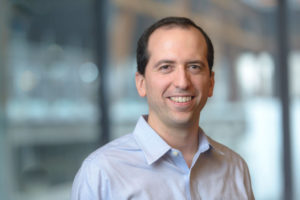
CEDSS: “Building a Scalable Clinical Genomics Program: How tumor, normal, and plasma DNA sequencing are informing cancer care, cancer risk, and cancer detection”
Elizabeth and Felix Rohatyn Chair & Associate Director of the Marie-Josée and Henry R. Kravis Center for Molecular Oncology
Memorial Sloan Kettering Cancer Center
Zoom Details
Meeting URL: https://stanford.zoom.us/s/92559505314
Dial: US: +1 650 724 9799 or +1 833 302 1536 (Toll Free)
Meeting ID: 925 5950 5314
Passcode: 418727
11:00am – 12:00pm Seminar & Discussion
RSVP Here
ABSTRACT
Tumor molecular profiling is a fundamental component of precision oncology, enabling the identification of oncogenomic mutations that can be targeted therapeutically. To accelerate enrollment to clinical trials of molecularly targeted agents and guide treatment selection, we have established a center-wide, prospective clinical sequencing program at Memorial Sloan Kettering Cancer Center using a custom, paired tumor-blood normal sequencing assay (MSK-IMPACT), which we have used to profile more than 50,000 patients with solid tumors. Yet beyond just the characterization of tumor-specific alterations, the inclusion of blood DNA has readily enabled the identification of germline risk alleles and somatic mutations associated with clonal hematopoiesis. To complement this approach, we have also implemented a ‘liquid biopsy’ cfDNA panel (MSK-ACCESS) for cancer detection, surveillance, and treatment selection and monitoring. In my talk, I will describe the prevalence of somatic and germline genomic alterations in a real-world population, the clinical benefits of cfDNA assessment, and how clonal hematopoiesis can inform cancer risk and confound liquid biopsy approaches to cancer detection.
ABOUT
Michael Berger, PhD, holds the Elizabeth and Felix Rohatyn Chair and is Associate Director of the Marie-Josée and Henry R. Kravis Center for Molecular Oncology at Memorial Sloan Kettering Cancer Center, a multidisciplinary initiative to promote precision oncology through genomic analysis to guide the diagnosis and treatment of cancer patients. He is also an Associate Attending Geneticist in the Department of Pathology with expertise in cancer genomics, computational biology, and high-throughput DNA sequencing technology. His laboratory is developing experimental and computational methods to characterize the genetic makeup of individual cancers and identify genomic biomarkers of drug response and resistance. As Scientific Director of Clinical NGS in the Molecular Diagnostics Service, he oversees the development and bioinformatics associated with clinical sequencing assays, and he helped lead the development and implementation of MSK-IMPACT, a comprehensive FDA-authorized tumor sequencing panel that been used to profile more than 60,000 tumors from advanced cancer patients at MSK. The resulting data have enabled the characterization of somatic and germline biomarkers across many cancer types and the identification of mutations associated with clonal hematopoiesis. Dr. Berger also led the development of a clinically validated plasma cell-free DNA assay, MSK-ACCESS, which his laboratory is using to explore tumor evolution, acquired drug resistance, and occult metastatic disease. He received his Bachelor’s Degree in Physics from Princeton University and his Ph.D. in Biophysics from Harvard University.
Hosted by: Utkan Demirci, Ph.D.
Sponsored by: The Canary Center & the Department of Radiology
Stanford University – School of Medicine
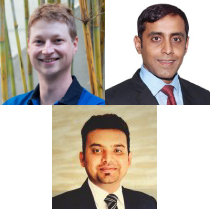
MIPS Special Seminar: Jubilant Biosys: Drug discovery and contract research services, from target discovery to candidate selection
Thomas Haywood, PhD
Head of International Radiochemistry Collaborations
Stanford University
Saurabh Kapure, MBA
Vice President, Business Development (USA & APAC)
Jubilant Biosys Limited
Jay Sheth, MBA
Manager Business Development, Drug Discovery Services, and CDMO
Jubilant Biosys Limited
LOCATION: Zoom
Meeting URL: https://stanford.zoom.us/j/98108346345
Dial: +1 650 724 9799 or +1 833 302 1536
Meeting ID: 981 0834 6345
Passcode: 397741
9:00-9:15 AM, PT – Thomas Haywood – Stanford Radiology projects
9:40-10:00 AM, PT – Moderated by Jason Thanh Lee – Discussion
ABOUT
Jubilant Biosys, an integrated contract research organization in India with business offices in Asia and North America, is a leading collaborator for biotechnology and pharmaceutical companies, with in-depth expertise in discovery informatics, medicinal chemistry, structural biology, and in vitro pharmacology services. Jubilant Biosys provides comprehensive drug discovery services and contract research services, from target discovery to candidate selection and with flexible business models (FFS, FTE and risk shared). This seminar will showcase case studies from recent Stanford projects and a discussion of future opportunities.
Sponsored by: Molecular Imaging Program at Stanford, Department of Radiology
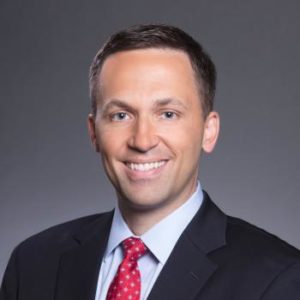
MIPS Seminar Series: Image-guided focal therapy for prostate cancer
Geoffrey Sonn, MD
Assistant Professor of Urology and, by courtesy, of Radiology (Molecular Imaging Program at Stanford)
Stanford University Medical Center
Location: Zoom
Webinar URL: https://stanford.zoom.us/s/96126703618
Dial: +1 650 724 9799 or +1 833 302 1536
Webinar ID: 961 2670 3618
Passcode: 186059
12:00pm – 12:45pm Seminar & Discussion
RSVP Here
ABSTRACT
In recent years, prostate cancer treatment has increasingly focused on selecting patients who are most likely to benefit and reducing harms from treatment. This has been seen both in adoption of active surveillance for men with low-risk prostate cancer and emergence of image-guided focal ablative therapy. While focal therapy causes fewer sexual and urinary side effects than conventional prostate cancer treatments, many questions remain about proper patient selection, treatment planning, and follow up care.
Improvements in prostate MRI performance and interpretation have paved the way for adoption of focal therapy. However, clinical challenges remain in prostate cancer imaging. This talk will describe prostate cancer focal therapy, discuss patient selection, and highlight the research efforts of my group to improve MRI interpretation to guide biopsy and improve focal therapy performance.
ABOUT
Geoffrey Sonn, MD is a urologic oncologist who specializes in treating patients with prostate and kidney cancer. He has a particular interest in cancer imaging, MRI-Ultrasound fusion targeted prostate biopsy, prostate cancer focal therapy, and robotic surgery for prostate and kidney cancer. He is the principal investigator of the first clinical trial in Northern California to use MRI-guided focused ultrasound to treat prostate cancer. The goal of this trial is to treat prostate cancer with fewer side effects than surgery or radiation.
Dr. Sonn was born in Washington State and lived there until leaving for college at Georgetown. After graduating magna cum laude at Georgetown he returned to the West Coast for medical school at UCLA. Following medical school, Dr. Sonn completed a 6-year urology residency at Stanford where he developed particular interests in the clinical care of patients with urologic cancers and research in cancer imaging. Dr. Sonn completed a 2-year urologic oncology fellowship at UCLA. Since completing his fellowship, Dr. Sonn has been at Stanford as an assistant professor in urology. Dr. Sonn’s research is devoted to developing new cancer imaging techniques, applying artificial intelligence to find cancers on medical images, and applying new methods to treat prostate cancer with fewer side effects.
Hosted by: Katherine Ferrara, PhD
Sponsored by: Molecular Imaging Program at Stanford & the Department of Radiology
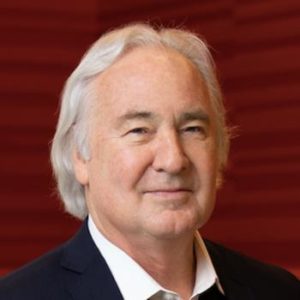
MIPS Seminar Series: Predicting and Preventing Fetal and Neonatal Pathology: Looking Back and Looking Forward
David K. Stevenson, MD
The Harold K. Faber Professor of Pediatrics, Senior Associate Dean, Maternal and Child Health and Professor, by courtesy, of Obstetrics and Gynecology
Lucile Packard Children’s Hospital
Zoom Webinar Details
Webinar URL: https://stanford.zoom.us/s/94584828060
Dial: +1 650 724 9799 or +1 833 302 1536
Webinar ID: 945 8482 8060
Passcode: 481874
12:00pm – 12:45pm Seminar & Discussion
RSVP Here
ABSTRACT
The importance of minimally invasive technologies for interrogating the fetus and newborn, as well as of knowing where a biologic system is headed, not just where it has been, when trying to predict and prevent acquired diseases, will be discussed. Examples of such technologies, such as trace gas analysis and optical reporting of biologic phenomena, and their application to model systems and the human newborn will be presented. The role of advanced computational approaches for the integration and interpretation of large amounts of data derived from these new measurement tools will be emphasized.
ABOUT
Dr. David K. Stevenson is the Harold K. Faber Professor of Pediatrics and has made many impactful contributions to the field of neonatology and pediatrics, including his seminal studies on neonatal jaundice, bilirubin production and heme oxygenase biology. As a neonatologist, his research has focused primarily on neonatal jaundice and more recently on the causes of preterm birth and its prevention. He has held numerous leadership roles at Stanford University School of Medicine, including Vice Dean and Senior Associate Dean for Academic Affairs. He is currently the Senior Associate Dean for Maternal & Child Health, the Co-Director of the Stanford Maternal & Child Health Research Institute, and the Principal Investigator for the March of Dimes Prematurity Research Center at Stanford University. Dr. Stevenson has received many awards, including the Virginia Apgar Award, which is the highest award in Perinatal Pediatrics, the Joseph W. St. Geme, Jr. Leadership Award from the Federation of Pediatric Organizations, the Jonas Salk Award for Leadership in Prematurity Prevention from the March of Dimes Foundation, and the John Howland Medal and Award, the highest award in academic pediatrics. He has served as the President of the American Pediatric Society. In recognition of his achievements, Dr. Stevenson is a member of the National Academy of Medicine.
Hosted by: Katherine Ferrara, PhD
Sponsored by: Molecular Imaging Program at Stanford & the Department of Radiology

CEDSS: The First Cell: A new model for cancer research and treatment
Azra Raza, M.D.
Chan Soon-Shiong Professor of Medicine
Director, Myelodysplastic Syndrome Center
Columbia University Medical Center
Location: Zoom
Meeting URL: https://stanford.zoom.us/s/99340345860
Dial: US: +1 650 724 9799 or +1 833 302 1536 (Toll Free)
Meeting ID: 993 4034 5860
Passcode: 711508
ABSTRACT
Cancer research continues to be predicated on a 1970’s model of research and treatment. Despite half a century of intense research, we are failing spectacularly to improve the outcome for patients with advanced disease. Those who are cured continue to be treated mostly with the older strategies (surgery-chemo-radiation). Our contention is that the real solution to the cancer problem is to diagnose cancer early, at the stage of The First Cell. The rapidly evolving technologies are doing much in this area but need to be expanded. We study a pre-leukemic condition called myelodysplastic syndrome (MDS) with the hope that we can detect the first leukemia cells as the disease transforms to acute myeloid leukemia (AML). Towards this end, we have collected blood and bone marrow samples on MDS and AML patients since 1984. Today, our Tissue Repository has more than 60,000 samples. We propose novel methods to identify surrogate markers that can identify the First Cell through studying the serial samples of patients who evolve from MDS to AML.
ABOUT
Dr. Raza is a Professor of Medicine and Director of the MDS Center at Columbia University in New York, NY.She started her research in Myelodisplastic Syndromes (MDS) in 1982 and moved to Rush University, Chicago, Illinois in 1992, where she was the Charles Arthur Weaver Professor in Oncology and Director, Division of Myeloid Diseases. The MDS Program, along with a Tissue Repository containing more than 50,000 samples from MDS and acute leukemia patients was successfully relocated to the University of Massachusetts in 2004 and to Columbia University in 2010.
Before moving to New York, Dr. Raza was the Chief of Hematology Oncology and the Gladys Smith Martin Professor of Oncology at the University of Massachussetts in Worcester. She has published the results of her laboratory research and clinical trials in prestigious, peer reviewed journals such as The New England Journal of Medicine, Nature, Blood, Cancer, Cancer Research, British Journal of Hematology, Leukemia, and Leukemia Research. Dr. Raza serves on numerous national and international panels as a reviewer, consultant and advisor and is the recipient of a number of awards.
Hosted by: Utkan Demirci, Ph.D.
Sponsored by: The Canary Center & the Department of Radiology
Stanford University – School of Medicine
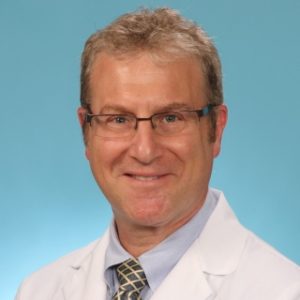
MIPS Seminar Series: Title TBA
Steven Paul Poplack, MD
Professor of Radiology (Breast Imaging)
Stanford University Medical Center
Location: Coming soon!
12:00pm – 12:45pm Seminar & Discussion
RSVP: Coming soon!
ABSTRACT
Coming soon!
ABOUT
Coming soon!
Hosted by: Katherine Ferrara, PhD
Sponsored by: Molecular Imaging Program at Stanford & the Department of Radiology
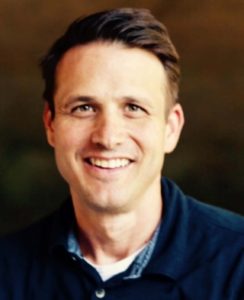
MIPS Seminar Series: Title TBA
Matthew Bogyo, PhD
Professor of Pathology and of Microbiology and Immunology and, by courtesy, of Chemical and Systems Biology
Stanford University
Location: Coming soon!
12:00pm – 12:45pm Seminar & Discussion
RSVP: Coming soon!
ABSTRACT
Coming soon!
ABOUT
Dr. Bogyo received a B.Sc. degree in Chemistry from Bates College in 1993 and a Ph.D. in Biochemistry from the Massachusetts Institute of Technology in 1997. After completion of his degree he was appointed as a Faculty Fellow in the Department of Biochemistry and Biophysics at the University of California, San Francisco. Dr. Bogyo served as the Head of Chemical Proteomics at Celera Genomics from 2001 to 2003 while maintaining an Adjunct Faculty appointment at UCSF. In the Summer of 2003 Dr. Bogyo joined the Department of Pathology at Stanford Medical School and was appointed as a faculty member in the Department of Microbiology and Immunology in 2004. His interests are focused on the use of chemistry to study the role of proteases in human disease. In particular his laboratory is currently working on understanding the role of cysteine proteases in tumorgenesis and also in the life cycle of human parasites and bacterial pathogens. Dr. Bogyo currently serves on the Editorial Board of Biochemical Journal, Cell Chemical Biology, Molecular and Cellular Proteomics and is an Academic Editor at PLoS One. Dr. Bogyo is a consultant for several biotechnology and pharmaceutical companies in the Bay Area and is a founder and board member of Akrotome Imaging and Facile Therapeutics.
Hosted by: Katherine Ferrara, PhD
Sponsored by: Molecular Imaging Program at Stanford & the Department of Radiology